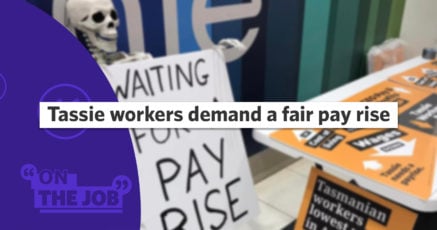Imagine the furore and anger that would be unleashed in our newspapers and on talkback radio if workers on Australia’s wharfs decided to shut down the docks without warning.
So, when a major shipping company threatens to do just that by locking out its workforce and leaving Australia’s shipping industry stranded, what was the response?
Crickets.
That double standard has been exposed by the response to Danish tugboat giant Svitzer’s recent threat to lock out 582 maritime workers across 17 Australian ports indefinitely in an attempt to blow up the bargaining process with the Maritime Union of Australia (MUA).
Svitzer holds a near-monopoly over hauling operations around Australia’s ports, and any lock out would have been a huge shock to the Australian economy.
The Fair Work Commission (FWC) ordered Svitzer to suspend its militant action, citing the threat it posed to the Australian economy. The FWC is yet to decide if the suspension is for a limited time or if it will be made permanent.
Jamie Newlyn is the Assistant National Secretary of the Maritime Union of Australia (MUA). He told “On the Job” that Svitzer’s behaviour was an insult to its workforce.
“We’d been bargaining for almost four years. Pre-COVID, we almost had an agreement. We decided to adjourn bargaining as the company came to terms with COVID protocols.”
“When we finally met six months later after putting pressure on Svitzer to resume bargaining, they came back with 30 claims – what we call the dirty 30.”
“They sought to strip all our conditions, basically, we might as well have gone back to the award. We’ve spent the next two and a half years arguing against the changes that they wanted.”
Jamie Newlyn
Assistant National Secretary of the Maritime Union of Australia (MUA)

Newlyn said the MUA put pressure on the company in an attempt to recommence good faith bargaining.
“We took limited industrial action. Every one of those pieces of action were designed to bring the company back to the table again, because they refuse to bargain.”
“They made an application to terminate the agreement similar to what Qantas had done in recent times.”
Minister for Workplace Relations, Tony Burke, condemned Svitzer’s actions.
“What Svitzer are attempting to do is economic vandalism,” Mr Burke said.
“They have decided to act now in a way that puts a whole lot of the Australian economy at risk, not simply their own workplace.”
During the FWC hearing the MUA’s legal counsel, Mark Gibian SC didn’t hold back, saying that Svitzer had chosen “the nuclear option” in a failed attempt to get the FWC to terminate the action and send both parties into arbitration.
“[Svitzer] doesn’t want to bargain with the unions anymore,” he said.
The MUA Assistant National Secretary was bemused by the lack of fire Svitzer received with its threats to shutdown Australian ports.
“Unions are often accused of being militant, but we never look at what happens when an employer does the same thing. Svitzer threatened a lockout would have shutdown every major port in Australia.”
“Svitzer were threatening to provide no relief at all. We already have a fuel security issue in this country, but they would have locked out fuel supplies.”
“When the MUA takes action, we always exempted things like cruise ships, animal livestock, fuel to some extent depending on where it was, and to deal with emergencies.”
“Svitzer indicated they weren’t prepared to do that. They were locking down everything in a bold move to crack down on its own workforce.”
Newlyn’s said that the stand off with the Danish tugboat company again underlines the urgent need for a better domestic shipping regime that protects Australia’s interests.
“The MUA has been arguing for quite some time for a better coastal shipping regime, and the Albanese government is committed to a strategic fleet.”
“There is currently a strategic fleet task force that has been convened with a few experts, and they’re tasked with delivering an interim report prior to Christmas, for the Minister for Transport Catherine King, and that that’s a welcome process for us.”
“We’re quite hopeful that there’ll be a return to the halcyon days of Australian shipping where we do to protect our sovereign supply chains, protect sovereign risk and ensure Australia’s commodities, exports and imports, AND guarantee our supply chains are secure.”













SHARE:
Dock disputes reveals double standard when it comes to maritime workers